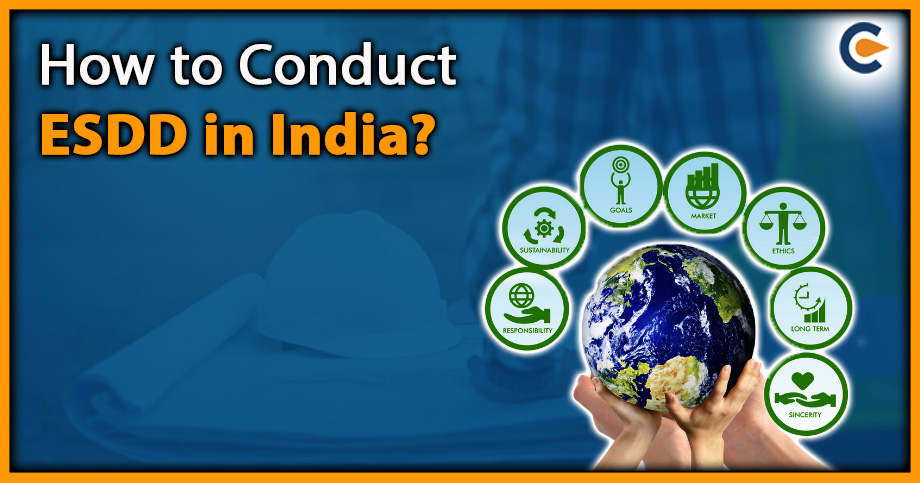Environmental and social due diligence (ESDD) has become integral to business decision-making. It involves evaluating the possible environmental and social risks and effects of a project, transaction, or investment. This process comprises various steps, such as scoping the assessment, gathering data, analysing risks, creating mitigation plans, disclosing the findings, and executing the strategies. By following this process, businesses can identify and manage environmental and social risks, enhance their performance in these areas, and comply with relevant laws and regulations and determine How to conduct ESDD for their business.
How Businesses Conduct Environmental and Social Due-Diligence (ESDD)
Environmental and social due diligence (ESDD) is the process of assessing the potential environmental and social risks and impacts associated with a project, transaction, or investment. Here are the steps on how to conduct ESDD.
- Identify the Scope: Define the scope of the ESDD, including the project, investment or transaction, and the countries and sectors involved. This will help determine the applicable laws, regulations, and standards that must be assessed.
- Collect Data: Gather all the necessary data to assess the environmental and social risks. This may include reviewing available reports, conducting site visits, and consulting with local stakeholders.
- Risk Assessment: Analyse the data to identify potential environmental & social risks or impacts associated with the project. This includes assessing the potential impacts on air and water quality, land use, biodiversity, human health and safety, and social issues such as labour rights and community impacts.
- Mitigation Strategies: Develop a plan to mitigate the identified risks and impacts, including measures to prevent or reduce adverse effects and actions to enhance positive impacts. This may include developing environmental and social management plans, setting targets and indicators, and establishing monitoring and reporting systems.
- Report and Disclosure: Prepare a report summarising the findings and mitigation strategies, and disclose this information to stakeholders, including investors, regulators, and affected communities.
- Implementation: Implement the mitigation strategies and monitor their effectiveness to ensure that environmental and social risks and impacts are effectively managed throughout the project lifecycle.
Laws That Regulate the Conduct of ESDD in India
Here is the list of laws an organisation must consider while conducting Environmental and Social Due-Diligence (ESDD) in India
Environmental Laws Governing How to Conduct ESDD
- Environmental Impact Assessment (EIA) Notification, 2006
- Air Act, 1981
- Water Act, 1974
- Forest (Conservation) Act, 1980
- Wildlife Protection Act, 1972
- Hazardous and Other Waste Rules, 2016
- Bio-Medical Waste Management Rules, 2016
- Plastic Waste Management Rules, 2016
Social Laws and Regulations Governing How to Conduct ESDD
- The Constitution of India provides for the protection of fundamental rights and lays down DPSPs that are relevant to social issues.
- The Factories Act 1948 provides for factory workers’ safety, health, and welfare.
- The Contract Labour Act, 1970, regulates the employment of labour that work on contract and provides for their welfare.
- The Child Labour Act of 1986[1] prohibits children’s employment in certain occupations and regulates the conditions of children’s work in other occupations.
- The Maternity Benefit Act of 1961 provides maternity benefits to women workers.
- The Equal Remuneration Act 1976 provides equal remuneration to men and women workforce for the work of a similar nature.
Documents Required When Performing ESDD
- Environmental and Social Assessment:
- Environmental Impact Assessment (EIA) report
- Social Impact Assessment (SIA) report
- Cumulative Impact Assessment (CIA) report
- Labour and Working Conditions:
- Human Resources Policy and Management Plan
- Worker’s rights policies
- Occupational health and safety policies
- Retrenchment plan
- Pollution Prevention and Abatement:
- Pollution prevention plan
- Waste management plan
- Hazardous material management plan
- Greenhouse gas emissions report
- Community Health, Safety and Security:
- Emergency response plan
- Community Health and safety plan
- Security personnel requirements plan
- Land Acquisition and Involuntary Resettlement:
- Land acquisition and compensation plan
- Resettlement plan
- Consultation and grievance mechanism plan
- Biodiversity Conservation and Sustainable Natural Resource Management:
- Biodiversity conservation plan
- Natural resource management plan
- Indigenous Peoples:
- Indigenous peoples plan
- Consultation and participation plan
- Cultural resources plan
- Cultural Heritage:
- Cultural heritage protection plan
- Heritage impact assessment report
Conclusion
As ESDD process involves several steps, including identifying the scope of the assessment, collecting data, assessing risks, developing mitigation strategies, reporting and disclosing the findings, and implementing the strategy, the knowledge of how to How to conduct ESDD becomes crucial. India has a comprehensive legal framework to regulate environmental and social issues, including laws and regulations related to pollution control, forest conservation, wildlife protection, hazardous waste management, and social welfare. In addition, the Constitution of India provides for the protection of fundamental rights and directive principles of state policy that are relevant to social issues. The laws and regulations related to environmental and social issues in India are constantly evolving. Businesses and investors must stay updated on these changes and comply with them to avoid legal and reputational risks. Therefore, it is recommended to take expert advice while conducting Environmental and Social Due-Diligence.
Read Our Article: How To Conduct SIA In India: An Overview











